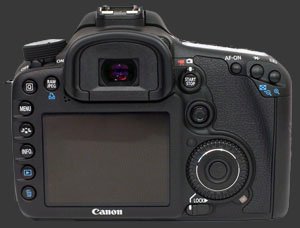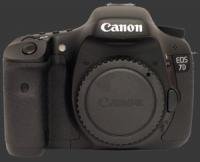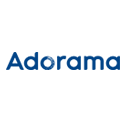Canon EOS 7D Review
Canon EOS 7D Usability - How easy is it to use?
The EOS 7D is a hefty camera, almost as big as the full-frame 5D Mark II and slightly heavier. It does not scream discretion but it does inspire confidence. Even the battery and memory card door feel sturdy. The rubber flaps that hide the connectors are the only soft-spots. The camera body is made of magnesium covered in a plastic shell and coated with rubber in front on both sides of the lens and on the right side of camera's back.

Holding the 7D is comfortable and provides a strong hold over the camera body. The grip is both deep and wide with sculpted details giving excellent support. A middle-finger hook just below the shutter provides upwards support. A bit higher, the shutter is placed on a slanted surface at the top of the grip. The slant and outward curve allow the index finger to wrap over the shutter-release smoothly. The back of the camera has an outward curve to secure the side of the thumb.
The shutter-release on this DSLR is a standard 2-stage release with a very soft halfway point. Travel to the halfway point requires some motion but it's a hair-trigger after that. Behind the trigger is a vertical control-wheel. The distance is reasonable but does require slightly more movement than desirable. Left and slightly back from the shutter is the tine M-Fn (Multi-Function) button. Its small size made it hard to locate with gloves but more time with the camera would probably improve this.

Behind the control wheel, there is a row of identical-size buttons, each with two seemingly reversed labels. After pressing any one of these buttons, two functions become active for several seconds or until the shutter is released. After pressing the Metering / WB button, for example, the control-wheel cycles through metering options while the command-dial cycles through white-balance options. The other identical buttons work the same way: Autofocus & Drive mode (AF / Drive) and ISO sensitivity & Flash EC (ISO / FC). These buttons being all identical in size and close together are unfortunately hard to operate without looking. While the control-wheel is relatively easy to reach without shifting your grip, the command-dial is not since it is placed too low on the camera's back.
One additional button to the right of the row triggers the back light for the top LCD panel. It would be more efficient if it just turned on automatically when needed. Otherwise, the top LCD has all the important information and is quite readable.

Along the upper-right edge of the camera's back are three round buttons. From left to right, they are AF-On, AE-L and focus-point selection. AF-On starts autofocus by default, AE-L locks exposure until the shutter is released and the last button allows using the joystick or dials to change focus-points. Pressing AE-L displays an asterisk to show that exposure is locked. The button is not a toggle, so if you press it accidentally, a shot must be taken to cancel the AE-L.
An outward curve guides the thumb to the left of the three buttons shown above. In this position, the thumb is just above the joystick, as seen on the previous page of this review. The joystick can be used for menu navigation but strangely it cannot confirm item selection. For that one must use the Set button. This makes it awkward to use.
Further down, there is a large rotating disk called the quick-dial. The quick-dial is used to cycle over just about anything: menu items, images, settings and more. After pressing a button, its function becomes active for the meter operating time which terminates when the shutter is released. When a setting is active, the quick-dial cycles through the different options for that setting. If no setting is active, the quick-dial controls exposure-compensation. To avoid accidental changes to exposure, the quick-dial has a Lock button. When the Lock is engaged, the quick-dial cannot change exposure-compensation. However, it can still cycle through menu options. The quick-dial is surely the least ergonomic aspect of the 7D, as it finds itself far from the natural resting area for the thumb.

Most remaining buttons are crowded around the left edge of the camera. This is similar to the 5D Mark II but with a few added buttons. It is much better than the arrangement of the 50D where the LCD is flush with the left side and constantly gets covered with nose marks. The buttons here have enough resistance to not be pressed while looking through the viewfinder. Going counter-clockwise from the top:
- RAW / JPEG simply saves the next shot in RAW and JPEG.
- Quick-Menu displays a status screen on the rear LCD. Use the joystick to select the setting to change and the quick-dial to cycle through its different settings. Some settings also use the control-wheel.
- Menu brings up the full menu system.
- Picture-Style allows the selection and modification of image parameters: sharpness, saturation, contrast and tone, all in 8 steps.
- Info cycles through up to 3 information screens: the status screen, camera parameter screen and the animated digital level.
- Play enters and exits playback mode. Pressing the shutter halfway goes to shooting-mode.
- Delete is used to delete the displayed image or movie. A prompt defaulting to Cancel appears before actually deleting the image.

The behavior of the Quick-Menu and Info buttons change in Live-View and Movie modes. In these modes, the Quick menu is an overlay with 2 items for Live-View and 3 items for Movie mode. The Info button magnifies the focus area during Live-View.
The Canon 7D has a 100% coverage viewfinder with 1X magnification factor. When factoring the sensor size, this represents one of the largest cropped-sensor viewfinders in production, just a hair smaller than the Nikon D300s. A comfortable soft rubber cup surrounds the viewfinder.

A high-resolution 3" LCD, just below the viewfinder, has an good angle-of-view and reasonable outdoor visibility due to a decent anti-reflective coating. Under bright direct light it still becomes hard to see. The LCD seems to have low contrast and is considerably too bright by default. This makes it look like most images are over-exposed, luckily a histogram can be used to check this more accurately. A lower brightness setting helps. There are two way to set the LCD brightness, either Automatic which comes in 3 flavors (Low, Medium (default) and High) or Manual which has 7 levels. The Auto Low seems to work well enough.
Controlling image parameters is easy with the Canon 7D. The Picture-Style button offers 6 predefined settings and 3 user defined ones. Even the predefined settings can be changed, with changes highlighted in blue.
More control of the camera is found in an orderly menu system. There are lots of options and some are 3-levels deep but the organization is reasonably intuitive. The trick is to use the control-wheel for change pages and the quick-dial for going up and down single page.
Certainly after using such a camera for a long time one can memorize the placement and function of every button, but the uniformity of many controls means more reliance on muscle memory is needed. ISO and metering could use more distinct buttons to aid changing those while looking through the viewfinder.

The final controls are the DOF-preview button and flash-release. The former is customizable, the latter is not. In all but Green and CA mode, the flash stays down unless it is released manually. In Green and CA mode, the flash may be released automatically if the camera decides to do so. Since this gives a completely different look to images, it is recommended to use the P automatic setting and decide for yourself whether the built-in flash should be used or not.
 |
Please Support Neocamera
All information on Neocamera is provided free of charge yet running this website is a huge endeavor. Purchases made via affiliate links found throughout the site help keep it running and up-to-date. There is no additional cost to you, so please consider buying via these links to our affilates:
If you found any information on this site valuable and did not purchase via our affiliate links, please considering donating via PayPal:
Any amount will be greatly appreaciated. Thank you for your support!
Canon 7D Highlights

Sensor-Size: 22 x 15mm

Actual size when viewed at 100 DPI
| 18 Megapixels DSLR | ISO 100-12800 |
| Canon EF Mount 1.6X FLM | Shutter 1/8000-30s |
| 100% Coverage Large Viewfinder | Full manual controls, including Manual Focus |
| 2 Axis Digital Level | Custom white-balance with 2 axis fine-tuning |
| Weatherproof | Spot-Metering |
| Built-in Dust Reduction | Hot-Shoe & Sync-Port |
| 8 FPS Drive, 126 Images | Stereo audio input |
| 1920x1080 @ 30 FPS Video Recording | Lithium-Ion Battery |
| 3" LCD 920K Pixels | Compact Flash |
Updates
2025.01.18

Fujifilm GFX 2025 Lens Roundup
Lens Review roundup of Fujifilm GFX Medium-Format lenses. Quality, performance and handling of the GF20-35mm F/4R WR, GF30mm F/3.5 Tilt-Shift and the GF55mm F/1.7.
2024.11.18

Best 2024 Photography Gifts for Every Budget
Great gifts for photographers and photo enthusiasts selected for every budget among the best products of 2024.
2024.08.07

Eye Protection Tips for Professional Photographers
The four main considerations for professional photographers regarding eyewear.
2024.07.14

Fujifilm X100VI Review
Flagship fixed-lens compact digital camera with a 40 MP sensor and Image-Stabilization, a first for the series. Retro design featuring dual control-dials, plus direct ISO, Shutter-Speed and EC dials. Its hybrid viewfinder can switch between EVF and OVF mode.
2024.05.09

Fujifilm GFX100 II Review
Flagship 102 Megapixels Medium-Format Mirrorless Digital Camera with 8-Stop 5-Axis IBIS, 8 FPS Drive, 8K Video and 400 MP Super-Resolution capture in a weatherproof and freezeproof body with dual control-dials and dual memory-card slots.
2024.04.03

Fujifilm X-T5 Review
Newest Fujifilm flagship boasting a 40 MP APS-C sensor, 5-axis IBIS with 7-stop efficiency, 15 FPS continuous drive, 6.2K Video capture, dual control-dials and dual SDXC UHS-II slots in a sturdy weatherproof and freezeproof body.
2023.11.20

Best Digital Cameras of 2023
Find out which are the Best Digital Cameras of 2023. All the new Mirrorless Digital Cameras from entry-level to high-end professional.
2023.07.10

Fujifilm X-H2 Review
40 Megapixels APS-C Hybrid Mirrorless Digital Camera with 7-stop IBIS. Fastest shutter ever and 8K video capture. Large builtin EVF with 0.8X magnification and 5.8 MP, plus an Eye-Start Sensor. Packed with features and large number of controls in a weatherproof and freezeproof body.
2023.05.07

Sony FE 20-70mm F/4G Review
Review of the unique Sony FE 20-70mm F/4G lens. The optical zoom of this lens spans ultra-wide-angle and medium focal-length coverage, making it one of the most versatile Full-Frame lenses on the market.
2023.01.15

Huion Inspiroy Dial 2 Review
Review of the Huion Inspiroy Dial 2 tablet, a medium sized drawing surface with dual dials and customizable buttons. Connects via USB-C or Bluetooth 5.0 with Windows, Linux and Android support.
2022.12.08

How to Pack for a Photo Trip
Find out how to pack for a travel photography trip, carry your gear safely while meeting airline regulations.
2022.11.13

Best Digital Cameras of 2022
The best digital cameras of 2022. A short list of the most outstanding models in their respective categories. Choose one for yourself or as a gift.











